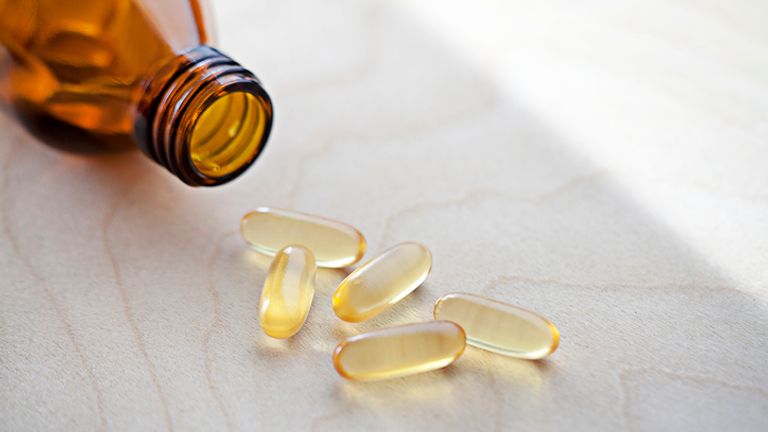The National Institute for Health and Care Excellence says more research is needed into the supplement.
Thursday 17 December 2020

Some studies have suggested the supplement could lessen the severity of coronavirus
There is "not enough evidence" that taking vitamin D prevents or treats COVID-19, experts have concluded.
The National Institute for Health and Care Excellence (NICE), which led the UK's rapid review, said more research was needed, particularly of high-quality randomised controlled trials
The health secretary asked NICE, Public Health England (PHE), and the Scientific Advisory Committee on Nutrition (SACN) to review the evidence after some studies suggested vitamin D might help fight coronavirus infection.
A US study suggested patients with sufficient levels of vitamin D experienced reduced infection and were less likely to experience complications and die from COVID-19.
Dr Paul Chrisp, director of the centre for guidelines at NICE, said: "While there is insufficient evidence to recommend vitamin D for the prevention or treatment of COVID-19 at this time, we encourage people to follow government advice on taking the supplement throughout the autumn and winter period."
Current PHE advice states that people should take 10 micrograms (400 IU) of vitamin D every day between October and early March to keep bones and muscles healthy.
PHE also advises those most at risk of not having enough vitamin D - such as people with dark skin or care home residents - take a vitamin D supplement all year round.
Around 2.7 million vulnerable people across England have been offered free vitamin D supplements this winter.
Professor Ian Young, chairman of the SACN, said: "This evidence review confirms that currently there is not enough available evidence to determine that there is a causal relationship between vitamin D and COVID-19."
There is "not enough evidence" that taking vitamin D prevents or treats COVID-19, experts have concluded.
The National Institute for Health and Care Excellence (NICE), which led the UK's rapid review, said more research was needed, particularly of high-quality randomised controlled trials
The health secretary asked NICE, Public Health England (PHE), and the Scientific Advisory Committee on Nutrition (SACN) to review the evidence after some studies suggested vitamin D might help fight coronavirus infection.
A US study suggested patients with sufficient levels of vitamin D experienced reduced infection and were less likely to experience complications and die from COVID-19.
Dr Paul Chrisp, director of the centre for guidelines at NICE, said: "While there is insufficient evidence to recommend vitamin D for the prevention or treatment of COVID-19 at this time, we encourage people to follow government advice on taking the supplement throughout the autumn and winter period."
Current PHE advice states that people should take 10 micrograms (400 IU) of vitamin D every day between October and early March to keep bones and muscles healthy.
PHE also advises those most at risk of not having enough vitamin D - such as people with dark skin or care home residents - take a vitamin D supplement all year round.
Around 2.7 million vulnerable people across England have been offered free vitamin D supplements this winter.
Professor Ian Young, chairman of the SACN, said: "This evidence review confirms that currently there is not enough available evidence to determine that there is a causal relationship between vitamin D and COVID-19."

COVID Christmas rules: What's allowed during the festive season?
Experts believe people may not have been making enough vitamin D from sunlight this year due to prolonged periods indoors as a result of the pandemic.
Dr Alison Tedstone, chief nutritionist at PHE, said: "Vitamin D is important for our bone and muscle health.
"We advise that everyone, particularly the elderly, those who don't get outside and those with dark skin, takes a vitamin D supplement containing 10 micrograms (400 IU) every day.
"This year, the advice is more important than ever with more people spending more time inside."
No comments:
Post a Comment